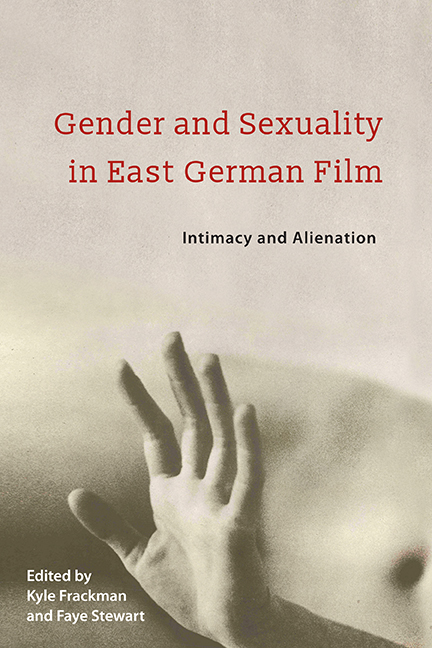Book contents
- Frontmatter
- Contents
- Acknowledgments
- List of Abbreviations
- Introduction: Sex and Socialism in East German Cinema
- 1 Hypnagogic Mothers: Gender, Amateur Film Labor, and the Transmissive Materiality of the Maternal Body
- 2 Powerless Heroines: Gender and Agency in DEFA Films of the 1960s and 1970s
- 3 Jutta Hoffmann and the Dialectics of Happiness: A Socialist Star in Close-Up
- 4 Who Is the “Third”? Homosociality and Queer Desire in Der Dritte
- 5 Volatile Intimacies and Queer Polyamory in GDR Film
- 6 Interracial Romance, Taboo, and Desire in the Eastern Counter-Western Blutsbrüder
- 7 The Desire to Be Desired? Solo Sunny as Socialist Woman's Film
- 8 Ambivalent Sexism: Gender, Space, Nation, and Renunciation in Unser kurzes Leben
- 9 Dealing with Cancer, Dealing with Love: Gender, Relationships, and the GDR Medical System in Lothar Warneke's Die Beunruhigung
- 10 Reimagining Woman: The Early Shorts of Helke Misselwitz
- 11 Shame and Love: East German Homosexuality Goes to the Movies
- 12 Gendered Spectacle: The Liberated Gaze in the DEFA Film Der Strass
- Notes on the Contributors
- Index
12 - Gendered Spectacle: The Liberated Gaze in the DEFA Film Der Strass
Published online by Cambridge University Press: 16 May 2018
- Frontmatter
- Contents
- Acknowledgments
- List of Abbreviations
- Introduction: Sex and Socialism in East German Cinema
- 1 Hypnagogic Mothers: Gender, Amateur Film Labor, and the Transmissive Materiality of the Maternal Body
- 2 Powerless Heroines: Gender and Agency in DEFA Films of the 1960s and 1970s
- 3 Jutta Hoffmann and the Dialectics of Happiness: A Socialist Star in Close-Up
- 4 Who Is the “Third”? Homosociality and Queer Desire in Der Dritte
- 5 Volatile Intimacies and Queer Polyamory in GDR Film
- 6 Interracial Romance, Taboo, and Desire in the Eastern Counter-Western Blutsbrüder
- 7 The Desire to Be Desired? Solo Sunny as Socialist Woman's Film
- 8 Ambivalent Sexism: Gender, Space, Nation, and Renunciation in Unser kurzes Leben
- 9 Dealing with Cancer, Dealing with Love: Gender, Relationships, and the GDR Medical System in Lothar Warneke's Die Beunruhigung
- 10 Reimagining Woman: The Early Shorts of Helke Misselwitz
- 11 Shame and Love: East German Homosexuality Goes to the Movies
- 12 Gendered Spectacle: The Liberated Gaze in the DEFA Film Der Strass
- Notes on the Contributors
- Index
Summary
ONE OF THE more curious events in German film history took place in Berlin on February 9, 1991, when the full-length DEFA feature film Der Strass (Rhinestones, 1991, dir. Andreas Hontsch) opened to the general public at the Kino Babylon. Audiences saw a film that was started in one country, the GDR, and finished months later—after the opening of the Berlin Wall on November 9, 1989, and German unification on October 3—in another one, the FRG. When released, the film had been financed half in East marks and half in West marks, as the currency union in July 1990 replaced East German currency with its West German counterpart. It was all the more curious because the director expected the film not to be released, but rather censored or banned due to its irreverent depiction of the GDR, personified in the figures of a photographer and the exotic dancer he pursues. Manifold changes in the country's political system more than just paved a path to democratic structures; they also enabled a new way of filmmaking independent of political restrictions. Der Strass became the first DEFA film made in a democratic GDR and became rather superfluous immediately, since, by the time of its release, the country of its production had ceased to exist.
By looking at Der Strass as a gendered spectacle, we propose a rereading of DEFA films produced during the Wende through a gendered lens. We perceive the film as a political statement articulated through the display of the eroticized female body. In our view, Der Strass embodies institutional and individual struggles against outmoded, inequitable methods of GDR filmmaking, as well as the opportunities offered by the historical changes for a frank, critical engagement with the failures of the political system. Thus, our approach to Der Strass is simultaneously informed by Fernando Solanas and Octavio Getino's concept of a Third Cinema that perceives of film as political statement, and by Laura Mulvey's theorization of the cinematic politics of the male gaze. In the following, the deployment of the female body in Der Strass is analyzed as a common trope to titillate and to evoke visceral reactions from the audience.
- Type
- Chapter
- Information
- Gender and Sexuality in East German FilmIntimacy and Alienation, pp. 249 - 268Publisher: Boydell & BrewerPrint publication year: 2018



